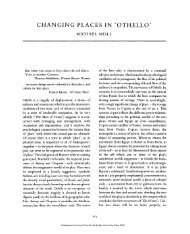the individualization of shakespeare's characters through imagery
the individualization of shakespeare's characters through imagery
the individualization of shakespeare's characters through imagery
You also want an ePaper? Increase the reach of your titles
YUMPU automatically turns print PDFs into web optimized ePapers that Google loves.
INDIVIDUALIZATION OF SHAKESPEARE'S CHARACTERS<br />
istic, by <strong>the</strong> way, that he swears by a two-faced God! He says that Cassio's military abilities are<br />
such as make him fit to stand with Caesar (n, iii, 128). He tells Cassio that Desdemona would<br />
have been "sport for Jove" (n, iii, 17). In contrast to <strong>the</strong> peaceful classical images in O<strong>the</strong>llo's<br />
role (Cupid, Diana) Iago's are <strong>of</strong> a warlike nature (Janus, <strong>the</strong> god <strong>of</strong> war, and Caesar). Iago is a<br />
pr<strong>of</strong>essional soldier, a soldier by trade, and it is <strong>the</strong>refore not to be wondered at that he himself<br />
speaks <strong>of</strong> "<strong>the</strong> trade <strong>of</strong> War" (1, ii, 1).<br />
There is one o<strong>the</strong>r group <strong>of</strong> images in Iago's role which is evidently not accidental, for it is<br />
quite a large and distinct group. These are typically naval images. Iago says that Cassio "be-lee'd<br />
and calm'd" him, i.e. won promotion over his head (1, i, 30). Instead <strong>of</strong> saying that <strong>the</strong> Senate<br />
had no o<strong>the</strong>r man <strong>of</strong> such abilities as O<strong>the</strong>llo, as we would say to-day, Iago says that "ano<strong>the</strong>r <strong>of</strong><br />
his fathom <strong>the</strong>y have none" (1, i, 153).<br />
Iago says that he must put out "a flag and sign <strong>of</strong> love, which is indeed but sign" (1, i, 157).<br />
Brabantio, in Iago's words, will pursue O<strong>the</strong>llo, in so far as "<strong>the</strong> law.. .will give him cable"<br />
(1, ii, 17). Iago assures Roderigo that he is knit to him with "cables <strong>of</strong> perdurable toughness"<br />
(1, iii, 343). Iago expresses it that in marrying Desdemona O<strong>the</strong>llo "hath boarded a land carack"<br />
(1, ii, 50), which in sailor's slang <strong>of</strong> that time meant a prostitute. Iago doubts whe<strong>the</strong>r it will<br />
prove a "lawful prize", an expression typical <strong>of</strong> freebooters. "My boat sails freely, both with<br />
wind and stream", says Iago (n, iii, 66). All this seems to indicate that Iago was probably once a<br />
sailor. In any case, he had been in England (11, iii, 79), and had also observed Danes, Germans<br />
and Hollanders drinking <strong>the</strong>mselves drunk.<br />
DESDEMONA<br />
Desdemona's role is poor in <strong>imagery</strong>, but whatever <strong>the</strong>re is <strong>of</strong> it is characteristic. First <strong>the</strong>re<br />
are poetic motifs: Desdemona accompanies her husband to <strong>the</strong> wars because she does not want<br />
to sit at home and be "a moth <strong>of</strong> peace" (1, iii, 258). She sings about <strong>the</strong> willow tree (iv, iii, 41),<br />
privately comparing herself to it, for <strong>the</strong> willow used to be <strong>the</strong> symbol <strong>of</strong> a girl or woman<br />
abandoned by her lover (Ophelia drowns under a weeping willow). "Her salt tears fell from<br />
her", sings Desdemona, "and s<strong>of</strong>ten'd <strong>the</strong> stones" (iv, iii, 47)—an image echoing <strong>the</strong> image <strong>of</strong><br />
<strong>the</strong> stony heart which occurs twice in O<strong>the</strong>llo's role. Desdemona cannot understand why<br />
O<strong>the</strong>llo should have changed toward her and says that evidently something "hath puddled<br />
his clear spirit" (m, iv, 142), and this, too, echoes O<strong>the</strong>llo's expression, cited above, that<br />
Desdemona is his 'fountain'. Desdemona's statement that "I'll watch him tame" (m, iii, 23)<br />
implies a comparison <strong>of</strong> O<strong>the</strong>llo to a hawk, and <strong>the</strong>se words again echo O<strong>the</strong>llo, who, as we have<br />
seen, likens Desdemona to a hawk. Thus, many <strong>of</strong> <strong>the</strong> images used by Desdemona echo<br />
O<strong>the</strong>llo's images.<br />
Desdemona's role also includes images <strong>of</strong> everyday domestic things. She says that she will<br />
tirelessly persuade O<strong>the</strong>llo to reinstate Cassio: "His bed shall seem a school, his board a shrift"<br />
(m, iii, 24). She says that her request to reinstate Cassio is as if she were asking O<strong>the</strong>llo to "wear<br />
gloves, or feed on nourishing dishes, or keep you warm" (m, iii, 77). The following is closely<br />
related to <strong>the</strong> same group <strong>of</strong> domestic, intimate images: when a finger aches all <strong>the</strong> o<strong>the</strong>r<br />
members <strong>of</strong> <strong>the</strong> body seem to share <strong>the</strong> pain (m, iv, 145).<br />
There is also a militant-heroic note in Desdemona's <strong>imagery</strong>. *' That I did love <strong>the</strong> Moor to live<br />
89<br />
Shakespeare Survey Online © Cambridge University Press, 2007



